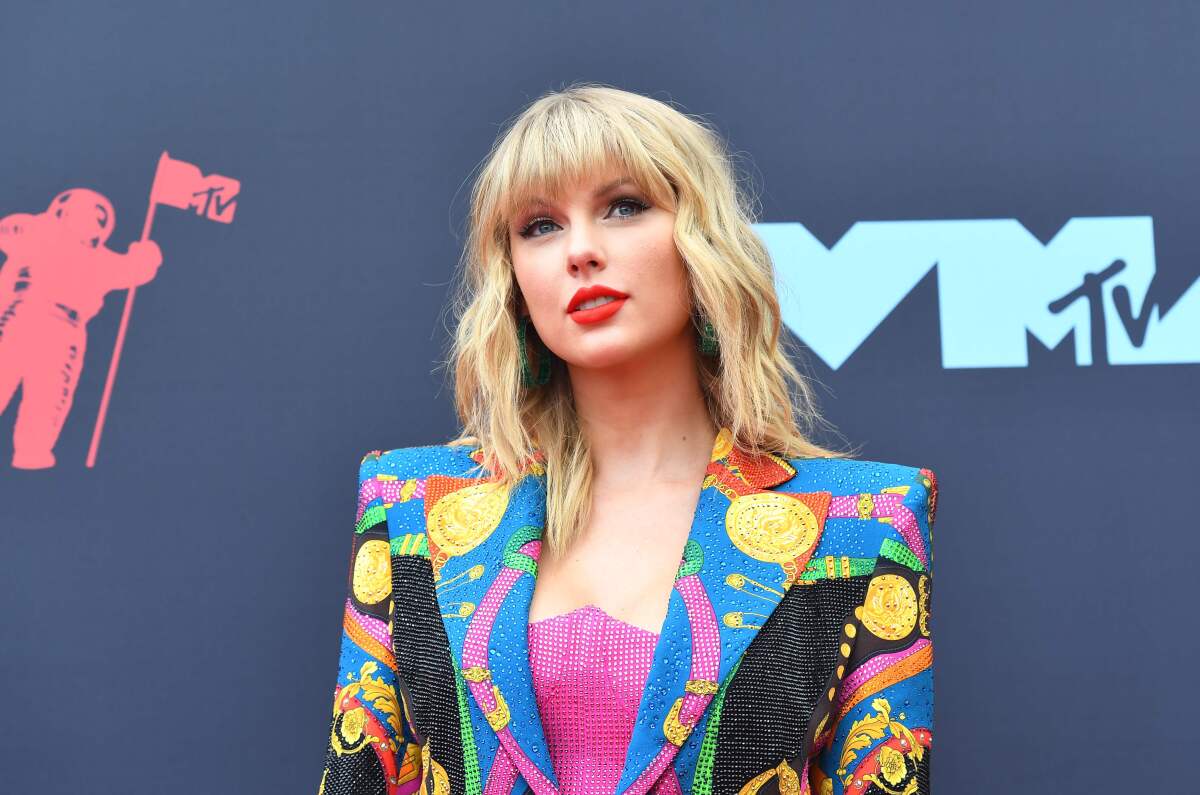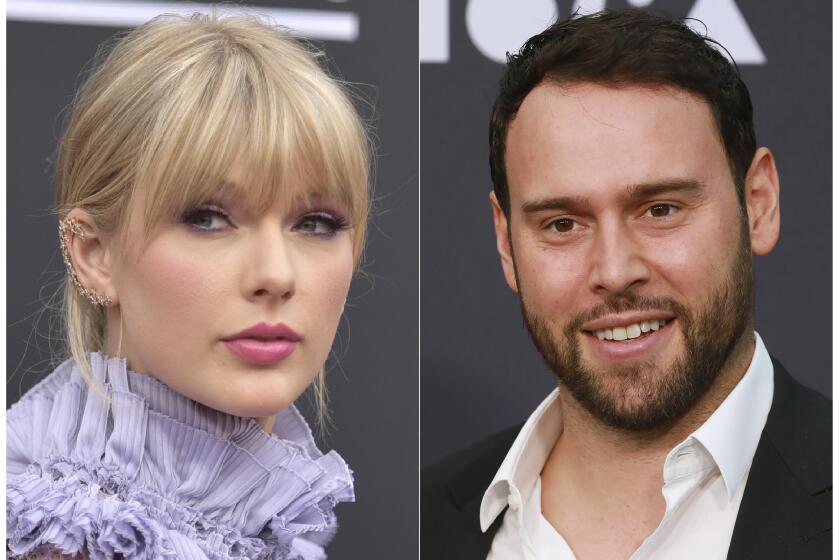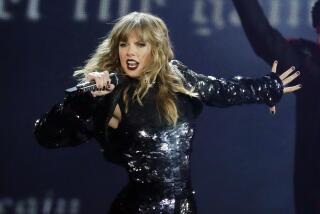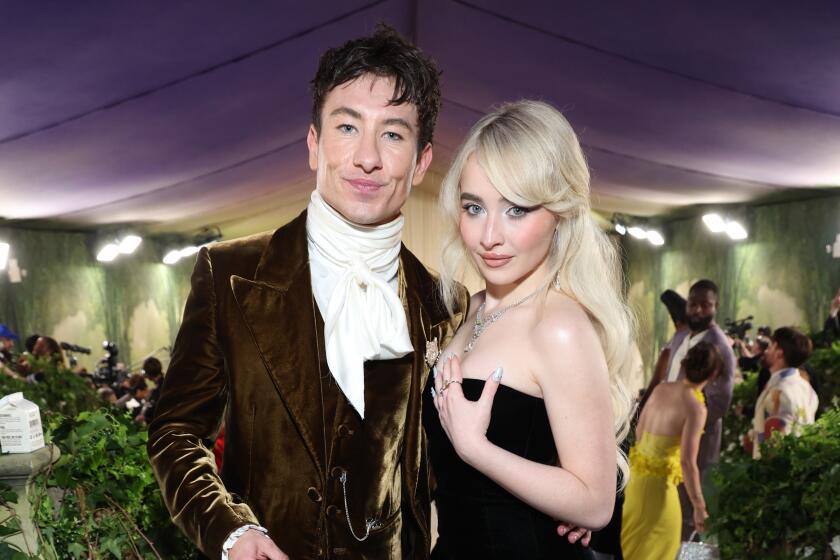Taylor Swift, Elizabeth Warren and the private equity debate, explained

- Share via
Taylor Swift’s ongoing dispute with her record company, the Big Machine Label Group, its founder Scott Borchetta and new owner Scooter Braun has caught the attention and elicited responses from at least two high-profile politicians: Democratic presidential hopeful Sen. Elizabeth Warren and freshman New York Rep. Alexandria Ocasio-Cortez.
Both called out the role that a private equity firm played in facilitating Braun’s $300-million purchase of Big Machine this year and private equity firms’ broader impact on the U.S. economy.
For the record:
4:21 p.m. Nov. 18, 2019An earlier edition of this post stated that the Carlyle Group private equity firm has $222 billion in assets. The company has $222 billion in assets under management.
Swift alleges that she’s being blocked from singing songs from her first six albums on Sunday’s American Music Awards by Big Machine Label Group, Borchetta and super manager Braun.
After Taylor Swift went public Thursday in her fight against her former label, Big Machine says it’s not preventing the star from performing her music.
Her name-check of the Washington, D.C.-based Carlyle Group private equity firm in her social media plea to elicit fan support brought the role of private equity in the sale of Big Machine to Braun front and center for her audience as well as politicians who have targeted the practice in their campaigns.
“Unfortunately, @TaylorSwift13 is one of many whose work has been threatened by a private equity firm,” Warren wrote on Saturday. “They’re gobbling up more and more of our economy, costing jobs and crushing entire industries. It’s time to rein in private equity firms — and I’ve got a plan for that.”
Ocasio-Cortez likewise struck out at such firms, who are increasingly investing their vast reserves in entertainment-world entities.
“Private equity groups’ predatory practices actively hurt millions of Americans,” the New York politician tweeted on Friday. “Their leveraged buyouts have destroyed the lives of retail workers across the country, scrapping 1+ million jobs. Now they’re holding @taylorswift13’s own music hostage. They need to be reigned in.”
The Carlyle Group was formed in 1987 and lists assets under management of $222 billion on its official website, which also states that the firm has interests in “365 investment vehicles” globally. It was not specified how much of the $300-million price Braun paid to buy BMLG came from the Carlyle Group, but even if it was the full amount, that would represent barely more than one-tenth of 1% of its stated investment assets under management. The firm became a minority owner in Braun’s Ithaca Holdings company in 2017 and also owns Content Partners LLC, which funds music, television and film projects, and Apex Parks Group, an amusement park operator.
As the music industry’s fortunes contracted dramatically over the last two decades during the digital revolution, such private equity firms have invested in record companies, music publishers, the concert business and artists themselves.
The practice extends beyond music as well, with major private equity companies becoming partners in the film and television industries, providing capital to fund content and infrastructure, often replacing traditional revenue sources such as advertising and home video sales that have eroded in the digital age.
In recent years private equity firms such as TPG and Blackstone Group Inc. have invested in music companies including streaming giant Spotify, publishing rights groups such as SESAC and the Harry Fox Agency SA in addition to TPG’s stakes in movie studios including STX Entertainment, which made “Hustlers,” and Blackstone’s investment in Merlin Entertainment, which owns Legoland in Carlsbad.
Private equity has played a key role in financing the growth of Hollywood’s talent agencies and their foray into production, which has fueled conflicts with the Writers Guild of America as the line between agencies and studios has blurred. TPG became majority owner of Creative Artists Agency in 2014. Endeavor, the company that owns the WME talent agency and UFC, is backed by private equity firm Silver Lake Partners.
Private equity also helped bail out studios like Metro-Goldwyn-Mayer when it was coming out of bankruptcy in 2011. Anchorage chief Kevin Ulrich ultimately took over leadership of the company. Private equity from all corners of the world has helped push money into the film sector, with firms such as TPG and China’s Hony Capital backing new start-ups like STX Entertainment. However, a political clampdown in China has dried up a source of funding for Hollywood. The leading theatrical circuit AMC Entertainment secured funding from Silver Lake last year after its shareholder Dalian Wanda sold a 28% stake.
On Friday, Swift posted a message to her Tumblr and Twitter accounts accusing Borchetta and Braun of threatening her with legal action if she sang any of the songs from her first six albums released by Big Machine at Sunday’s American Music Awards, without meeting conditions she said they were imposing. Swift, scheduled to be crowned “artist of the decade” on the show, said she’d planned to sing a medley of the songs with which she had scored hits over the past decade.
Swift said the Big Machine camp’s legal team argued that it would consider her performance of any older songs on the awards show to be a re-recording of those songs, given that the program is taped for later broadcast on the West Coast. She is contractually precluded from re-recording her earliest material before November 2020 under terms of her original contract with Big Machine, which released her debut album, “Taylor Swift,” in 2006 when she was 17.
A reported agreement between BMLG and Dick Clark Productions allowing Swift to perform her earlier songs on Sunday was circulating in the media on Monday, but Dick Clark Productions disavowed it.
“At no time did dick clark productions agree to, create, authorize or distribute a statement in partnership with Big Machine Label Group regarding Taylor Swift’s performance at the 2019 American Music Awards,” the company’s statement read. “Any final agreement on this matter needs to be made directly with Taylor Swift’s management team. We have no further comment.”
Representatives for Big Machine and the Carlyle Group did not respond immediately on Monday to The Times’ request for comment.
Swift last week asked fans to lobby Big Machine, Borchetta, Braun and the Carlyle Group on her behalf, after charging that she would only be cleared to sing the older songs on two conditions: that she drop plans she has announced to re-record her Big Machine albums once the contract provision against it terminates next year; and to stop speaking out about Borchetta and Braun.
They denied they were precluding her from performing on the AMA show but did not directly address her claim that it was her older material that was the focus of their objection, not the live performance itself.
“I just want to be able to perform my own music,” Swift wrote last week. “That’s it.”
Times staff writers Meg James and Anousha Sakoui contributed to this report.
More to Read
The biggest entertainment stories
Get our big stories about Hollywood, film, television, music, arts, culture and more right in your inbox as soon as they publish.
You may occasionally receive promotional content from the Los Angeles Times.












